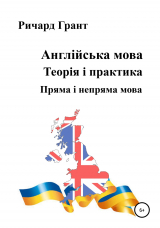
Текст книги "Англійська мова. Теорія і практика. Пряма і непряма мова"
Автор книги: Ричард Грант
Жанр:
Иностранные языки
сообщить о нарушении
Текущая страница: 1 (всего у книги 2 страниц)
Ричард Грант
Англійська мова. Теорія і практика. Пряма і непряма мова
Direct speech або пряма мова – це слова будь-якої людини, що передаються буквально так, як вони і були вимовлені. На листі пряма мова виділяється лапками, а після слів, що вводять пряму мову, ставиться кома.
She says, «The lessons begin at 9 o’clock.»– Вона каже:«Заняття починаються о 9 годині».
Indirect speech або непряма мова – це мова, що передається не слово в слово, а тільки за змістом, у вигляді додаткових підрядних речень. При цьому кома, що відокремлює слова мовця від прямої мови, і лапки, в які взята пряма мова, опускаються.
She says that the lessons begin at 9 o’clock. – Вона каже, що заняття починаються о 9 годині.
У непрямій мові займенник I замінюється займенником he або she.
Direct speech: She said, «I will buy a dress.» – Вона сказала: «Я куплю сукню».
Indirect speech: She said that she would buy a dress. – Вона сказала, що купить сукню.
Якщо в головному реченні дієслово-присудок стоїть в минулому часі (Past Simple), то при перекладі прямої мови в непряму, дотримуються правила узгодження часів, і перед непрямої промовою ставиться сполучник that, який після дієслів say, know, think i iнших може бути опущений.
Direct speech: She said, «The lessons begin at 9 o’clock.» – Вона сказала: «Заняття починаються о 9 годині».
Indirect speech: She said (that) the lessons began at 9 o’clock. – Вона сказала, що заняття починаються о 9 годині.
Direct speech: Ann said, «I bought two tickets for the theatre.» – Ана сказала: «Я купила два квитка в театр».
Indirect speech: Ann said (that) she had bought 2 tickets for the theatre. – Ана сказала, що вона купила 2 квитки в театр.
Узгодження часів у непрямій мові
Direct speech – Indirect speech
Present Simple – Past Simple
He said, «I am hungry!» – He said that he was hungry.– Він сказав: «Я голодний!» – Він сказав, що він голодний.
Present Continuous – Past Continuous
Mother said, «I am cooking the dinner now.» – Mother said that she was cooking the dinner then.– Мама сказала: «Я зараз готую обід». – Мама сказала, що вона готувала обід.
Present Perfect – Past Perfect
She said, «I have worked hard today.» – She said that she had worked hard that day.– Вона сказала: «Я багато працювала сьогодні». – Вона сказала, що вона багато працювала в той день.
Present Perfect Continuous – Past Perfect Continuous
I said, «My colleague has only been working here for 3 months.» – I said that my colleague had only been working there for 3 months.– Я сказав: «Моя колега працює тут всього 3 місяці». – Я сказав, що моя колега працювала там всього 3 місяці.
Past Simple – Past Perfect
She said, «I had a cold a week ago.» – She said that she had had a cold a week before.– Вона сказала: «Тиждень тому у мене була застуда». – Вона сказала, що тиждень до цього у неї була застуда.
Past Continuous – Past Perfect Continuous
Tom said, «I was watching the football match.» – Tom said that he had been watching the football match.– Том сказав: «Я дивився футбольний матч». – Том сказав, що він дивився футбольний матч.
Past Perfect – Past Perfect
My friend said to me, «I had known you before we were introduced to each other.» – My friend told me that he had known me before we were introduced to each other.– Мій друг сказав мені: «Я знав тебе до того, як нас представили один одному». – Мій друг сказав мені, що він знав мене до того, як нас представили один одному.
Past Perfect Continuous – Past Perfect Continuous
My wife said, «We had been dating for 3 years before we got married.» – My wife said that we had been dating for 3 years before we got married.– Моя дружина сказала: «Ми зустрічалися 3 роки, перш ніж одружилися». – Моя дружина сказала, що ми зустрічалися 3 роки, перш ніж одружилися.
Future Simple (will) – Future in the Past (would)
The doctor said, «You will get the result of your blood test tomorrow.» – The doctor said that I would get the result of my blood test the next day.– Лiкар сказав: «Ви отримаєте результат свого аналізу крові завтра». – Лiкар сказав, що я отримаю результат мого аналізу крові на наступний день.
Модальні дієслова в непрямій мові
Якщо в прямій мові були модальні дієслова, то ті з них, які мають форми минулого часу, зміняться в непрямій мові, наприклад: can – could, may – might, have (to) – had (to). Решта при переході в непряму мову не змінюється.
Direct speech: He said, «The contract can be signed in the evening.» – Він сказав: «Контракт може бути підписаний ввечері».
Indirect speech: He said that the contract could be signed in the evening. – Він сказав, що контракт може бути підписаний ввечері.
Direct speech: She said to him, «You should (ought to) send them a telegram immediately.» – Вона сказала йому: «Вам слід негайно послати їм телеграму».
Indirect speech: She told him that he should (ought to) send them a telegram immediately. – Вона сказала йому, що йому слід послати їм телеграму негайно.
Дієслово must замінюється в непрямій мові дієсловом had, коли виражає необхідність вчинення дії в силу певних обставин:
Direct speech: She said, «I must send him a telegram at once.» – Вона сказала: «Я повинна послати йому телеграму негайно».
Indirect speech: She said that she had to send him a telegram at once. – Вона сказала, що повинна послати йому телеграму негайно.
Коли дієслово must висловлює наказ або пораду, то воно залишається без зміни:
Direct speech: He said to her, «You must consult a doctor.» – Він сказав їй: «Ви повинні порадитися з лікарем».
Indirect speech: He told her that she must consult a doctor. – Він сказав їй, що вона повинна порадитися з лікарем.
У деяких випадках необхідно узгодити не тільки часи, а й окремі слова.
Direct speech: He said, «I am dying now». – Він сказав: «Я вмираю зараз».
Тобто в даний момент він помирає. Однак, коли ми будемо передавати його слова, то будемо говорити вже не про зараз, а про момент часу в минулому (той, коли він вмирав). Тому ми змінюємо now (зараз) на then (тоді).
Indirect speech: He said that he was dying then. – Він сказав, що він помирав тоді.
Слова, що змінюються в непрямій мові
Direct speech – Indirect speech
this, these – that, those– цей, ці – той, ті
here – there– тут – там
now – then– зараз – тоді
today – that day– сьогодні – в той день
tomorrow – next day– завтра – на наступний день
yesterday – the day before– вчора – за день
ago – before– тому – до того, раніше
last – the previous, before– минулий – попередній, раніше
next – the following– наступний – наступний
Виняток:
Правило узгодження часів не дотримується:
1. У підрядних реченнях, які виражають загальновідомий факт або істину.
Не said that 22 December is the shortest day of the уеаг. – Він сказав, що 22 грудня – найкоротший день у році.
2. Коли в підрядному реченні є модальні дієслова must, should, ought to:
I said that I must meet her. – Я сказав, що мені треба зустріти її.
3. Якщо мовець посилається на слова, які тільки що були сказані:
Kate: «Stay with me, Mark. I will cook something delicious.» – Кейт: Залишся зі мною, Марк. Я приготую що-небудь смачне.
Mark to Elza: «Kate said she will cook something delicious.» – Марк Ельзе: Кейт сказала, що приготує щось смачне.
4. У підрядному реченні, що вводиться сполучниками when/since, де простий минулий час (Past Simple) не змінює своєї форми:
I answered that I hadn’t met her since we moved. – Я відповів, що не бачив її після того, як ми переїхали.
5. Якщо мовець використовував час Past Continuous із зазначенням точного часу дії, то вiн не змінюється в непрямій мові, незалежно від того, в якому часі стоїть дієслово, яке вводить непряму мову:
«I was working at 6 o'clock.» – He said that he was working at 6 o'clock.
Питання в непрямій мові
У непрямій мові питання мають прямий порядок слів, а знак питання в кінці речення замінюється на крапку.
Загальні питання вводяться сполучниками if або whether:
Direct speech: I asked, «Have you seen my pen?» – Я запитав: «Ти бачив мою ручку?»
Indirect speech: I asked him whether/if he had seen my pen. – Я запитав, чи бачив він мою ручку..
Спеціальні питання вводяться питальними словами:
Direct speech: He wondered: “Who on earth would buy this junk?!” – Він поцікавився: «Хто взагалі стане купувати цю рухлядь?!»
Indirect speech: He wondered who on earth would buy that junk. – Він поцікавився, хто взагалі стане купувати ту рухлядь.
Коротка відповідь на питання непрямої мови вводиться сполучником that без слів yes/no:
Direct speech: She answered, «Yes, I do.» – Вона відповіла: «Так».
Indirect speech: She answered that she did. – Вона відповіла ствердно.
Наказові речення в непрямій мові
Такі речення використовуються з дієсловами say, tell, order, ask, beg, дієслово в наказовому способі змінюється в форму інфінітива:
Direct speech: Mom told me, «Clean your room.» – Мама сказала мені: «Прибери свою кімнату».
Indirect speech: Mom told me to clean my room. – Мама сказала мені прибрати свою кімнату.
Заперечна форма дієслова в наказовому способі замінюється інфінітивом з попередньою часткою not.
Direct speech: He said, «Don’t run in the corridor.» – Він сказав: «Не бігайте в коридорі».
Indirect speech: He said not to run in the corridor. – Він сказав не бігати в коридорі.
Нижче представлені деякі дієслова – introductory verbs, які дозволяють передати чужу мову без постійного використання she said або he asked:
agree – погоджуватися
Direct speech: “Ok, I was wrong.” – «Я був неправий.»
Indirect speech: He agreed that he had been wrong. – Він погодився, що був неправий.
claim – заявляти
Direct speech: “I saw the UFO.” – «Я бачив НЛО.»
Indirect speech: He claimed that he had seen the UFO. – Він заявив, що бачив НЛО.
complain – скаржитися
Direct speech: “You never share any secrets with me!” – «Ти ніколи не ділишся зі мною секретами.»
Indirect speech: She complained that I never shared any secrets with her. – Вона скаржилася, що я ніколи не ділився з нею секретами.
admit – визнавати
Direct speech: “I was really unfriendly to him.” – «Я дійсно була з ним ворожа.»
Indirect speech: She admitted that she had been unfriendly to him. – Вона визнала, що була з ним ворожа.
deny – заперечувати
Direct speech: “I didn’t break your favorite cup!” – «Я не розбивав твоєї улюбленої чашки!»
Indirect speech: He denied that he had broken the cup. – Він заперечував, що розбив чашку.
exclaim – вигукнути
Direct speech: “I am so happy!” – «Я така щаслива!»
Indirect speech: She exclaimed that he was very happy. – Вона вигукнула, що була щаслива.
explain – пояснити
Direct speech: “You see, there’s no point in going there right now.” – «Бачиш, немає причини йти туди прямо зараз.»
Indirect speech: He explained that there was no point in going there at that moment. – Він пояснив, що не було причини йти туди в той момент.
recommend – радити
Direct speech: “You’d better stay at home.” – «Тобі було б краще залишатися вдома.»
Indirect speech: She recommended that we stayed at home. – Вона радила, щоб ми залишилися вдома.
prove – доводити
Direct speech: “See, the system works.” – «Дивись, система працює.»
Indirect speech: He proved that the system worked. – Він довів, що система працювала.
state – стверджувати
Direct speech: “I have never seen the young man before.” – «Я ніколи не бачив цього юнака раніше.»
Indirect speech: The witness stated that she had never seen the young man before. – Свідок стверджував, що ніколи раніше не бачив того юнака.
promise – обіцяти
Direct speech: “I will be back no later than eight o’clock.” – «Я вернуся не пізніше 8 годин.»
Indirect speech: Dad promised that he would be back no later than eight o’clock. – Тато пообіцяв повернутися не пізніше 8 годин.
suggest – пропонувати
Direct speech: “Shall we spend the evening together?” – «Ми проведемо разом вечір?»
Indirect speech: He suggested that they spent the evening together. – Він запропонував провести вечір разом.
assert – стверджувати
Direct speech: “Nuclear power is a safe and non-polluting kind of energy.” – «Ядерна енергія безпечна і не призводить до забруднень.»
Indirect speech: The scientists asserted that nuclear power is a safe and non-polluting kind of energy. – Вчені стверджували, що ядерна енергія безпечна і не призводить до забруднень.
contend – заявляти
Direct speech: “The Earth may be much younger than previously thought.” – «Земля може бути набагато молодшою, ніж думали раніше.»
Indirect speech: Some astronomers contend that the Earth may be much younger than previously thought. – Деякі астрономи заявили, що Земля може бути набагато молодшою, ніж думали раніше.
Вправи
Запам'ятайте:
this → that
here → there
today → that day
tomorrow → the next day
Вправа 1
Передайте наступні наказові речення у непрямій мові.
1. “Explain to me how to solve this problem,” my friend said to me. 2. The teacher said to me, “Hand this note to your parents, please.” 3. The doctor said to Nick, “Open your mouth and show me your tongue.” 4. Oleg said to his sister, “Put the letter in an envelope and give it to Kate.” 5. “Don’t be afraid of my dog,” said the man to Kate. 6. “Please help me with this work, Henry,” said Robert. 7. “Take this book and read it,” said the librarian to the boy. 8. “Please bring me some fish soup,” he said to the waitress. 9. The doctor said to Pete, “Don’t go for a walk today.” 10. “Don’t worry over such a small thing,” she said to me. 11. “Don’t eat too much ice cream,” Nick’s mother said to him. 12. “Please don’t mention it to anybody,” Mary said to her friend. 13. “Go home,” the teacher said to us. 14. “Promise to come and see me,” said Jane to Alice.
Вправа 2
Передайте наступні наказові речення у непрямій мові.
1. “Buy some meat in the shop,” my mother said to me. 2. Не said to us, “Come here tomorrow.” 3. “Sit down at the table and do your homework,” my mother said to me. 4. I said to Mike, “Send me a telegram as soon as you arrive.” 5. “Don’t forget to clean your teeth,” said granny to Helen. 6. Father said to me, “Don’t stay there long.” 7. “Don’t sit up late,” said the doctor to Mary. 8. Peter said to them, “Don’t leave the room until I come back.” 9. “Take my luggage to Room 145,” he said to the porter. 10. He said to me, “Ring me up tomorrow.” 11. “Bring me a cup of black coffee,” she said to the waiter. 12. “Don’t be late for dinner,” mother said to us. 13. Jane said to us, “Please tell me all you know about it.” 14. She said to Nick, “Please don’t say anything about it to your sister.”
Запам'ятайте:
last → previous, before
these → those
now → then
yesterday → the day before
next → the following
now → at once
ago → before
Вправа 3
Передайте наступні наративні речення у непрямій мові.
1. Oleg said, “My room is on the second floor.” 2. The woman said to her son, “I am glad I am here.” 3. Masha said, “I usually spend my holidays in the south.” 4. The mother said, “The children are in the nursery, doctor.” 5. “When your turn comes, listen very carefully to what the doctor tells you, ”I said to my grandmother. 6. He said, “I am sure she will ring me up when she is back in Toronto.” 7. Mike said, “We have bought these books today.” 8. She said, “I spent my holidays in the Crimea last year.” 9. “I have no time for lunch today,” said the boy to his mother. 10. “If you are in a hurry, we will do only the first experiment,” the laboratory assistant said to me. 11. Misha said, “I saw them at my parents’ house last year.” 12. She said to me, “Now I can read your translation.” 13. Boris said, “I go to the south every year.” 14. “You speak English very well,” the woman said to me. 15. “I won’t start anything new until I have finished this novel,” said the writer to the correspondent.
Вправа 4
Передайте наступні наративні речення у непрямій мові.
1. He said, “I haven’t seen my cousin today.” 2. “This man spoke to me on the road,” said the woman. 3. He said, “I am going to a ski resort tomorrow.” 4. My brother said to me, “I am going to become a doctor.” 5. “When I get a job, I’ll buy you a warm coat,” said the boy’s father. 6. “I don’t go to this shop very often,” she said. 7. “I can’t explain this rule to you,” my classmate said to me. 8. Ann said to us, “They haven’t come yet.” 9. My uncle said to us, “I buy several newspapers every day.” 10. “If you spill the milk, there won’t be any for the cat,” my mother said to me. 11. Tom said, “I have already had breakfast, so I am not hungry.” 12. The teacher said to the class, “We will discuss this subject tomorrow.” 13. She said to us, “They arrived in Toronto yesterday.” 14. The teacher said to the pupils, “Next year we will have six hours of English a week.” 15. “When you come to see me on Sunday, I will show you my new dress,” she said to me.
Вправа 5
Передайте наступні наративні речення у непрямій мові.
1. He said, “I have just received a letter from my uncle.” 2. Our teacher said, “Thackeray’s novels are very interesting.” 3. I said, “I have been in London for a fortnight’s holiday. My friends in London sometimes invite me to spend my leisure time with them.” 4. He said to me, “I want to see you today.” 5. “If Mary arrives before seven, bring her to our house for the evening,” said Jane to Henry. 6. “I am going to the theatre tonight,” he said to me. 7. She said, “You will read this book in the 9th form.” 8. Nick said, “I have never been to London. I think I will go there next year.” 9. She said, “I am free tonight”. 10. “Don’t wait until I come. As soon as you finish the exercises, begin playing volleyball,” said the PT teacher to the pupils. 11. Mike said, “I spoke to Mr. Brown this morning.” 12. Nellie said, “I read Jane Eyre last year.” 13. He said, “I will not stay with my friends too long.” 14. Mother said to me, “I feel bad today.” 15. “As soon as Robert appears, ask him where he put the dictionary,” said Mary to her mother.
Вправа 6
Передайте наступні наративні речення у непрямій мові.
1. He said to her, “I will do it today if I have time.” 2. “My friend lives in Toronto,” said Alec. 3. He said to me, “They are staying at the Grand Hotel Europe.” 4. The pupil said to the teacher, “I can do my homework after dinner.” 5. I said to them, “I can give you my uncle’s address.” 6. “You have not done your work well,” the teacher said to me. 7. He said, “They are leaving next Monday.” 8. The teacher said to Jack, “You work hard, I know. You are a good boy.” 9. The poor man said to the rich man, “My horse is wild. It can kill your horse.” 10. The clerk said to them, “You can leave the key with the maid upstairs.” 11. The old man said to the girl, “You can sing perfectly well. I think you will be a famous singer.” 12. The rich man said to the judge, “This man’s horse has killed my horse.” 13. My sister said to me, “You look very well, much better than you looked yesterday. I think you have recovered after your illness.” 14. “You are an excellent cook. Everything is so tasty,” my guest said to me. 15. The student said, “I can’t answer this question. I don’t understand it.”
Вправа 7
Передайте наступні наративні речення у непрямій мові. Вживайте будь-який іменник або займенник у ролі підмета головного речення.
1. I will come as soon as I am ready. 2. There will be an interesting lecture at our school tomorrow. One of our teachers will speak about Charles Dickens. 3. You will know that I have gone to the concert if I am not at home by eight. 4. Last year I spent my summer vacation in the Caucasus. 5. I’ll come to the Philharmonic with you if you get the tickets. 6. I came to live in this town several years ago. 7. Five years ago there were no people living here at all. 8. I’ll be reading you a story until it is time to go to bed. 9. I will go skiing on Sunday if I have time. 10. I have read all about it in today’s newspaper. 11. They finished building this house only last week. 12. It’s not funny if there is no money, sonny. 13. It will be so pleasant when Tom comes home. 14. I will do it now if you like. 15. My brother was here early today. 16. It’s a pity you didn’t come earlier.
Вправа 8
Відновіть пряму мову у наступних реченнях.
1. Tom said he would go to see the doctor the next day. 2. I asked if they had taken the sick man to hospital. 3. He told me he was ill. 4. I asked my friend if he had a headache. 5. He told me he had fallen ill. 6. I wanted to know when he had fallen ill. 7. They told me that Tom had not come to school the day before. 8. I wondered if he had taken his temperature. 9. I told my sister that she might catch a cold. 10. I asked him if the doctor had given him some medicine. I asked him if he was feeling better now. 11. She told me she had caught a cold.
Вправа 9
Відновіть пряму мову у наступних реченнях.
1. I asked the man how long he had been in Toronto. 2. Не said that while crossing the English Channel they had stayed on deck all the time. 3. I asked him if he was going to a ski resort in Colorado. 4. The woman said she had felt sick while crossing the Channel. 5. We asked the girl if her father was still in Toronto. 6. She said she was feeling bad that day. 7. I asked the girl what sort of work her father did. 8. The old man told the doctor that he had pain in his right side. 9. He said he had just been examined by a good doctor. 10. He said he would not come to school until Monday. 11. The man said he had spent a month at a seaside resort. 12. He said that his health had greatly improved since then.
Вправа 10
Передайте наступні спеціальні питання у непрямій мові.
1. I said to Nick, “Where are you going?” 2. Pete said to his friends, “When are you leaving Toronto?” 3. I said to him, “How long are you going to stay there?” 4. He said to them, “Who will you see before you leave the city?” 5. I said to him, “How long will it take you to get there?” 6. They said to him, “What time does the train leave?” 7. He said to her, “Where do you usually spend your summer holidays?” 8. I asked Mike, “What will you do after dinner?” 9. Ann said to Mike, “When did you leave London?” 10. I asked my uncle, “How long did you stay in the Crimea?” 11. She said to Boris, “When will you be back home?” 12. Mother said to me, “Who has brought this parcel?” 13. Boris said to them, “How can I get to the railway station?” 14. Ada said to me, “Where did you see such trees?” 15. Mary asked Tom, “What time will you come here tomorrow?” 16. I said to Becky, “What kind of book has your friend brought you?” 17. She asked me, “Why didn’t you come here yesterday?” 18. She asked me, “What will you do tomorrow if you are not busy?”








